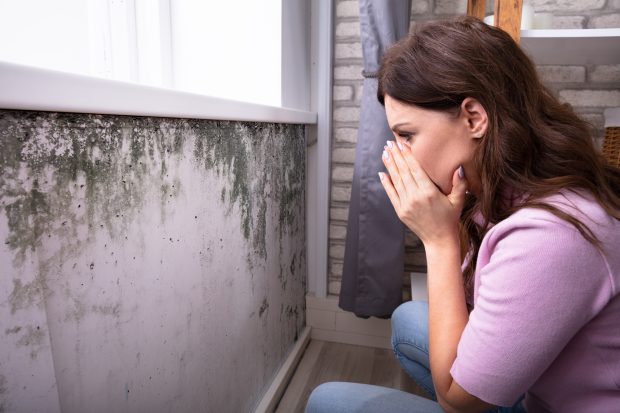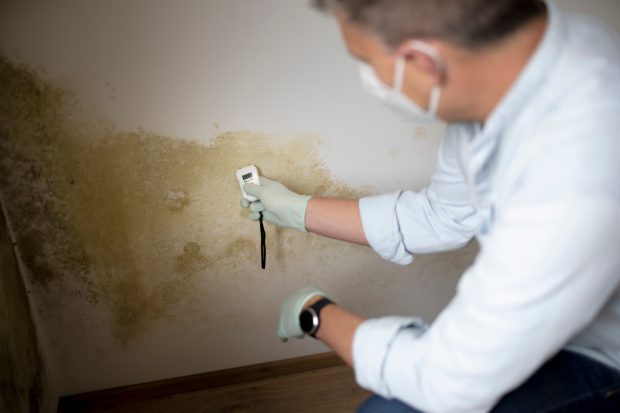Mold growth can be problematic in a home. It’s unsightly and can damage your insulation, floors, ceiling, and walls. Additionally, mold poses several health risks. It can cause allergy-like symptoms such as headaches, fatigue, runny nose, sneezing, watery eyes, and an itchy throat. Besides that, mold may also trigger asthma symptoms.

Therefore, it’s crucial for you as a homeowner to keep your property mold-free. To ensure this, consider regular mold testing.
What Is Mold Testing?
Mold testing involves evaluating the levels, locations, and types of mold present in your home. A mold inspector typically conducts the following:
- Air Testing
Air testing involves taking air samples from your home. The mold inspection expert uses a spore trap that allows a certain volume of air to pass and adhere to a sticky surface. If mold spores are present, these will be captured in the air sample taken from your home.
The professional will then take the air sample to a laboratory for evaluation. In the lab, an expert will open the spore trap and apply a stain that mold can absorb. This way, they can tell if mold is present in the provided sample. If so, they’ll establish the type and volume of mold spores in the collected air sample.
- Surface Testing
Surface testing involves taking surface samples and testing them for mold. The inspector may take the following:
- Swab Samples: The mold testing professional will use something similar to a cotton swab to rub across a particular area. After that, they’ll take the collected sample to a lab or evaluate it themselves.
- Wipe Samples: Instead of a swab, the mold inspector will use a wipe to collect samples. This method is used when mold growth cannot be seen by the naked eye.
- Tape Samples: Clear tape is pressed against a surface and removed. The mold picked up by the tape will be sent to the lab for analysis.
- Bulk Samples: Taking a bulk sample involves removing a part of the area with mold growth and testing it or taking it to the lab.
According to the U.S. Environmental Protection Agency (EPA), outdoor mold growth is not worrisome because it plays a vital role in decomposing organic matter like fallen leaves and dead tree branches. However, indoor mold growth should be avoided at all costs.

Why Should You Consider Professional Over DIY Mold Testing
Some homeowners may opt for a DIY mold testing kit because purchasing it is cheaper than hiring a professional. In this case, you collect the surface or air samples and then send them to a lab for analysis.
Even so, you must evaluate if a mold test kit is cost-effective in the long run. In most cases, the benefits of getting an expert for mold testing far outweigh the costs.
Below are the advantages of choosing professionals for mold testing in your home:
- Provides Accurate Mold Testing
A significant reason to consider professional services like Atlas Labs Air Quality & Mold Testing is that you’ll get more accurate results. Some DIY kits don’t provide much other than a positive or negative outcome. In some cases, you might even get a false positive or a false negative result.
Some factors can influence the reliability of lab results if you opt for a mold test kit.
One is that you don’t have specialized instruments like infrared cameras and hygrometers that detect mold in hidden or unlikely areas. Also, some mold growth is invisible to the naked eye. It’s highly probable you’ll miss these areas when you collect mold samples. Consequently, lab results will show a negative result, which is misleading.
Second, when you ship the mold samples to the laboratory for testing, these can be improperly handled or subjected to extreme temperatures, affecting the lab results.
Third, if the mold testing kit has been sitting on the shelf for quite some time, its ingredients may have been exposed to extreme temperatures or high humidity, affecting the accuracy of results.
On the other hand, mold testing specialists can deliver more reliable results. Since experts perform the inspection and testing, they can easily identify the type, intensity, location, and source of the fungus in your house.
If there’s mold in your space, the inspector may eliminate it themselves. If not, they can recommend a mold remediation contractor for the job.
- Offers Quick Test Results
A mold testing kit is not as DIY as you think. You need to send your mold samples to a lab, and it may take several days to receive the results. In the meantime, the mold could be spreading in your home.
However, certified mold inspectors can deliver faster lab test results. For one thing, you don’t have to bother with shipping the samples to the lab. Also, mold testing professionals use technologically advanced machines that can provide quick results.
Furthermore, they can provide an in-depth analysis of mold contamination on your property. So, if mold is present, you can take the necessary remediation measures to get rid of it. This way, you can prevent mold from wreaking havoc in your home.
- Prevents Mold Exposure
Looking for mold all over your home can be exhausting. You might stop searching at some point. Also, you may not know where to look without proper training and experience. Some homeowners might only check for mold if there’s water damage.
It’s advisable to test your home for this fungus at least once each year. If there’s high humidity or rainfall in your area, mold testing should be done more frequently.
Professionals can do a thorough job when testing your home for mold. Aside from conducting a visual inspection, they use advanced equipment like thermal imaging cameras to help them detect mold behind walls and in other hidden areas.
Additionally, they know exactly where to look for the fungus. They might remove drywall or paneling to evaluate the ceilings and walls.
Mold exposure can lead to health issues like coughing, sneezing, whizzing, headaches, and difficulty breathing. In some cases, mold can severely affect one’s lungs, skin, and heart. In addition, it can cause neurological problems and asthma complications.
A mold testing specialist can detect mold contamination and give recommendations for proper elimination. Hence, they can effectively prevent mold exposure and protect you and your loved ones from the health issues caused by the fungus.
- Gives Better Property Protection
Besides shielding you and your loved ones from harmful mold effects, a thorough job by an inspector can also protect your property better. Usually, if mold isn’t completely removed, it can spread to your interior wallpaper, between walls, under floors, on the supporting beams, and in other areas of your house.
Essentially, it’s a parasite that eats organic materials like cardboard, wood, ceiling tiles, or drywall. It can devour building materials, thereby causing serious structural damage. If this happens, you might need expensive mold elimination services. However, if your home is severely ruined, mold remediation may be insufficient to restore your property.
By locating and thoroughly eliminating mold from your home, professionals can ensure this fungus doesn’t grow and spread out of control. This way, they can save your house from serious structural damage.
- Saves More Money
Some homeowners may prefer going the DIY route over hiring a professional because buying a kit is cheaper. However, the reliability of these mold test kits can be affected by how the samples are collected, handled, and shipped to the lab for analysis.
Furthermore, using such kits means you have to do the mold inspection and sample collection yourself. Although you can collect samples where there’s visible mold growth, you’re likely to miss areas where mold can only be detected using technical tools.
Hence, you might not be able to determine the extent of mold contamination in your home. As a result, you may be lulled into a false sense of complacency as the fungus multiplies in your property.
If mold is allowed to proliferate, it could lead to severe structural damage that requires expensive repairs. The worst-case scenario is that you may have to tear down and rebuild your house.
On top of property damage, you and your loved ones could develop serious health issues. You’ll incur additional expenses, such as hospital bills and medications.
For these reasons, a DIY mold test kit may not be cost-effective in the long term. On the other hand, relying on professionals can help you save money by protecting your family’s health and your home from structural damage.
Final Thoughts
Mold can destroy the aesthetic appeal of your home, cause structural damage, and lead to health complications. Therefore, regular mold testing is essential.
Some homeowners may prefer getting a mold test kit over hiring a professional. Going for DIY mold sample collection may seem the cheaper alternative, but you may get inaccurate or unreliable results due to other factors. On the other hand, opting for professional services for mold inspection and testing can save you more money in the long run.
Other benefits of hiring mold testing specialists include a thorough inspection and quick test results. Also, they can give expert advice on how to prevent mold exposure and protect your property more effectively.
Working with professionals with extensive experience and the right equipment can give you peace of mind. So, if you plan to have your home tested soon, consider reaching out to the experts.



